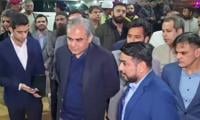Islamabad: Pakistan is ready to accept any requirement for admission into Nuclear Suppliers Group (NSG) as long as it is non-discriminatory and does not infringe on its right to develop the nuclear capability.
Former Chairman Joint Chiefs of Staff Committee (CJCSC) General (r) Ehsanul Haq made this remark while speaking at a conference organised by the Centre for International Strategic Studies (CISS) on the recently held NSG plenary in Switzerland. The topic of the conference was ‘A Review of 27th NSG Plenary: Outcome and Implications.’
No decision with regards to the admission of non-NPT states (primarily India and Pakistan) was taken at the Bern Plenary of the 48-member group of nuclear suppliers. The issue was discussed during the meeting and the participating governments agreed upon continuing the deliberations. An informal meeting of the cartel is expected to be convened in November later this year in Vienna for further discussions on the criteria for admission of non-NPT states.
Consensus on new admissions has continued to elude the group for the second consecutive year. The issue was first discussed at the Seoul Plenary in 2016. Consultations among the members have continued since then.
Pakistan has been pursuing NSG membership for mainstreaming itself as a country with nuclear capability and access to technological advancements. “We can be flexible as long as it does not infringe on our red flags. It cannot be used as a coercion, or containment or curtailment of our sovereign rights,” General Haq, who has remained closely associated with the nuclear programme said, adding anything that would be non-discriminatory would be acceptable to Pakistan.
The former CJCSC warned against continued stigmatization of Pakistan over AQ Khan scam. “Pakistan has a very good record on export controls and safety and security. We cannot be in perpetual punishment and banishment for AQ Khan affair. We are past that by more than a decade and a half and we undertook some very stringent measures,” he maintained.
Khalil Hashmi, Director General at Foreign Office’s Arms Control and Disarmament Division, in his presentation noted that the process for admission of non-NPT states has slowed down as compared to the rush exhibited by some countries in 2016. He said “hard reality has dawned” upon some of NSG members that the process “cannot be short-circuited. Hashmi further noted that positions of NSG countries have not changed much and during this year’s plenary it was more of a reiteration of those. “There wasn’t something new said or argued,” he added.
Director Strategic Plans Division Zahir Kazmi said, “Pakistan is committed to the objective of non-proliferation and shares the global concern regarding proliferation of weapons of mass destruction and their means of delivery. Pakistan, when admitted in NSG, would like to constructively contribute to the global non-proliferation regime.” Recalling the importance of NSG membership for Pakistan, Kazmi said it was essential for its socio-economic development and technological advancement. NSG, he said, would gain from accepting Pakistan in its folds.
Executive Director CISS Ali Sarwar Naqvi said Pakistan merits consideration for NSG membership in its overall commitments and undertakings. He reminisced that Pakistan’s interest in NSG was longstanding and goes back nearly two decades. Pakistan, he maintained, complies with a number of conditions of NSG: commitment to nuclear non-proliferation; nuclear safety; nuclear security; strong regulatory framework; and robust command and control structure. He said although Pakistan is not a signatory of the NPT, but was committed to and implements facility-specific safeguards under the INF-CIRC 66.
A general view of Islamabad city can be seen in this picture released on January 5, 2023. —...
People buy fish at the G-9 weekly bazaar in the federal capital as demand rises despite high white meat prices during...
Islamabad Capital Territory Police stand guard on the road of Islamabad. — AFP/FileOver the past decades,...
A group photo from the USAID’s Higher Education System Strengthening Activity's impactful four-day training on...
The picture shows Islamabad police personnel in this undated photo. — AFP/FileIslamabad : The capital city of...
Prof Ayaz Qureshi from University of Edinburgh,UK addressing an event.— Facebook@iubwp/File Islamabad : Prof Ayaz...







